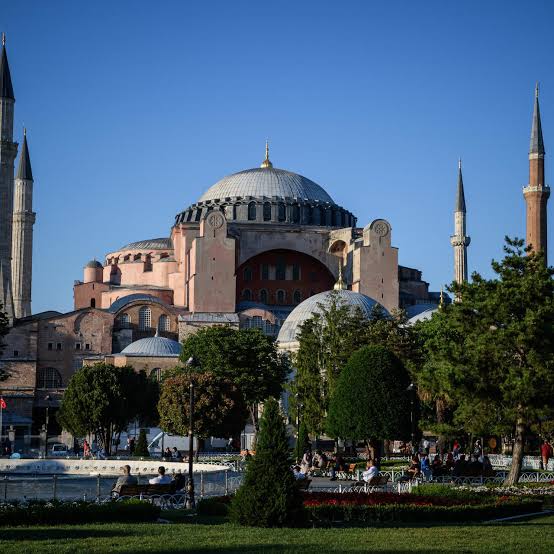Turkey’s highest administrative court will on Thursday review a petition calling for Istanbul’s iconic Hagia Sophia museum to be reconverted into a mosque.
SEE ALSO: Caverton Pilots Arrested for Flying Expatriates into Rivers state
Built by the Byzantines, it was the largest church in Christendom from the 6th century for nearly a millennium, where emperors were crowned.
It was converted into a mosque following the Ottoman conquest of Constantinople, modern-day Istanbul, in 1453 led by Sultan Mehmet II (the Conqueror).
Four minarets were added to the structure.
Its status was changed to a museum after a 1934 decree.
The court’s decision could come on Thursday or within 15 days, state news agency Anadolu reported.
Religious hardliners have long demanded that the UNESCO World Heritage Site be made a mosque again.
Before elections last year, President Recep Tayyip Erdogan spoke of the possibility of naming it a mosque.
It is a divisive issue in Turkey, where many view Hagia Sophia’s current status as emblematic of the country’s secular constitution.
Opposition parties see the revival of the debate as Erdogan’s way of rallying his Islamic conservative base while distracting from an economic crisis and the coronavirus pandemic.
The petition being heard in the Council of State was brought by a little-known association, whose 75-year-old head, Ismail Kandemir, has been fighting for 26 years for the change.
He recently told Kanal7 TV that he has “dedicated his life” for Hagia Sophia to be reopened for Islamic prayers.
Kandemir is seeking an annulment of the decree by Mustafa Kemal Ataturk, the founder of the modern Turkish republic, which changed the status of the monument to a museum.
The retired teacher alleged that Ataturk’s signature on the decree was fake.
He recalled praying secretly at the Hagia Sophia in his 20s and is now determined to do so “freely”.
In May, the Koran’s al-Fath sura resounded from the monument to commemorate the 567th anniversary of the Ottoman conquest of Constantinople.
Erdogan joined the event via videoconference.
Towering over Istanbul’s skyline, its breath-taking domes seemingly afloat, Hagia Sophia is a cultural landmark for both Christians and Muslims and is visited by millions of tourists each year.
The Istanbul governor’s office said there were 3.7 million visitors in 2019 alone.
Also part of the UNESCO heritage listing from 1985 is the historic Blue Mosque, which is located across the square from Hagia Sophia.
It is open to both tourists and worshippers.
“The conversion of Hagia Sophia into a mosque will disappoint millions of Christians around the world and Hagia Sophia, which, due to its sacredness, is a vital centre where East is embraced with the West, will fracture these two worlds,’’ said Patriarch Bartholomew I, the spiritual leader of the Orthodox Christian Church, in Istanbul on Tuesday.
In an open letter on Wednesday, scores of Byzantine and Ottoman scholars from across the world appealed: “Hagia Sophia is too beautiful a monument and too precious a historical document to serve as a pawn in regional politics’’.
They noted that there has been a room for Islamic prayer within the complex since 1991, and a full-time Imam since 2016.
“Thus, in a certain sense, Hagia Sophia is currently functioning as both a museum and a mosque,’’ they wrote.
Any change in status could inflame tensions with Greece, as Athens condemns the use of the former seat of the Greek Orthodox Church for religious purposes.
Turkey has derided Greece, saying Athens is the only European capital without a mosque.
The United States urged Turkey to maintain the site as a museum.
Secretary of State, Mike Pompeo, said on Wednesday that a change in status would diminish the legacy of the monument “and its unsurpassed ability … to serve humanity as a much-needed bridge between those of differing faith traditions and cultures’’.
Turkish Foreign Ministry spokesman, Hami Aksoy, responded that Hagia Sophia “like all cultural assets on our land, is the property of Turkey’’.
Turkish media have reported that Islamic prayers could be held there on July 15, the fourth anniversary of a failed coup.




 Premier League
Premier League